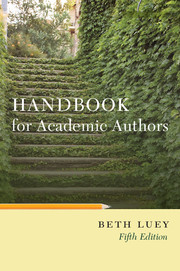Book contents
- Frontmatter
- Contents
- Illustrations
- Preface to the Fifth Edition
- Preface to the Fourth Edition
- Preface to the Third Edition
- Preface to the Second Edition
- Preface to the First Edition
- Chapter 1 The Publishing Partnership
- Chapter 2 Journal Articles
- Chapter 3 Revising a Dissertation
- Chapter 4 Finding a Publisher for the Scholarly Book
- Chapter 5 Working with Your Publisher
- Chapter 6 Multiauthor Books and Anthologies
- Chapter 7 Finding a Publisher for the College Textbook
- Chapter 8 Working with Your Textbook Publisher
- Chapter 9 Books for General Readers
- Chapter 10 The Mechanics of Authorship
- Chapter 11 Costs and Prices
- Chapter 12 Born Digital
- Bibliography
- Index
- References
Chapter 5 - Working with Your Publisher
Published online by Cambridge University Press: 02 December 2010
- Frontmatter
- Contents
- Illustrations
- Preface to the Fifth Edition
- Preface to the Fourth Edition
- Preface to the Third Edition
- Preface to the Second Edition
- Preface to the First Edition
- Chapter 1 The Publishing Partnership
- Chapter 2 Journal Articles
- Chapter 3 Revising a Dissertation
- Chapter 4 Finding a Publisher for the Scholarly Book
- Chapter 5 Working with Your Publisher
- Chapter 6 Multiauthor Books and Anthologies
- Chapter 7 Finding a Publisher for the College Textbook
- Chapter 8 Working with Your Textbook Publisher
- Chapter 9 Books for General Readers
- Chapter 10 The Mechanics of Authorship
- Chapter 11 Costs and Prices
- Chapter 12 Born Digital
- Bibliography
- Index
- References
Summary
I have dealt with a good many publishers, and while I have found some few of them arrogant, discourteous, oppressive, and generally abominable in both personal and business intercourse, I desire to record my testimony that as a class they are courteous and honorable gentlemen; fair and liberal in views, intentions, and actions, and pleasant and intelligent in mind and intercourse.
Frederick B. PerkinsWhen a publisher accepts your book, you are beginning a relationship that will last for years. Both of you will be happier if you understand clearly what the publisher expects and what you can reasonably expect of the publisher. The basic responsibilities of both author and publisher are set out in the publishing contract, and you must read and understand that document. You should also know how to work with the press's staff throughout the various stages of editing and production. Finally, you should think about how you can help the publisher promote your book.
The Contract
You will receive a contract when a publisher decides to publish your book. Most publishers send two copies, both signed, with the request that you sign and return one copy. Others will send a draft contract for your review. Even in the former case, you should never sign a contract until you have read and understood it. Nor, in the former case, should you conclude, as many authors do, that the contract is nonnegotiable, that you must simply take it or leave it.
- Type
- Chapter
- Information
- Handbook for Academic Authors , pp. 68 - 106Publisher: Cambridge University PressPrint publication year: 2009



